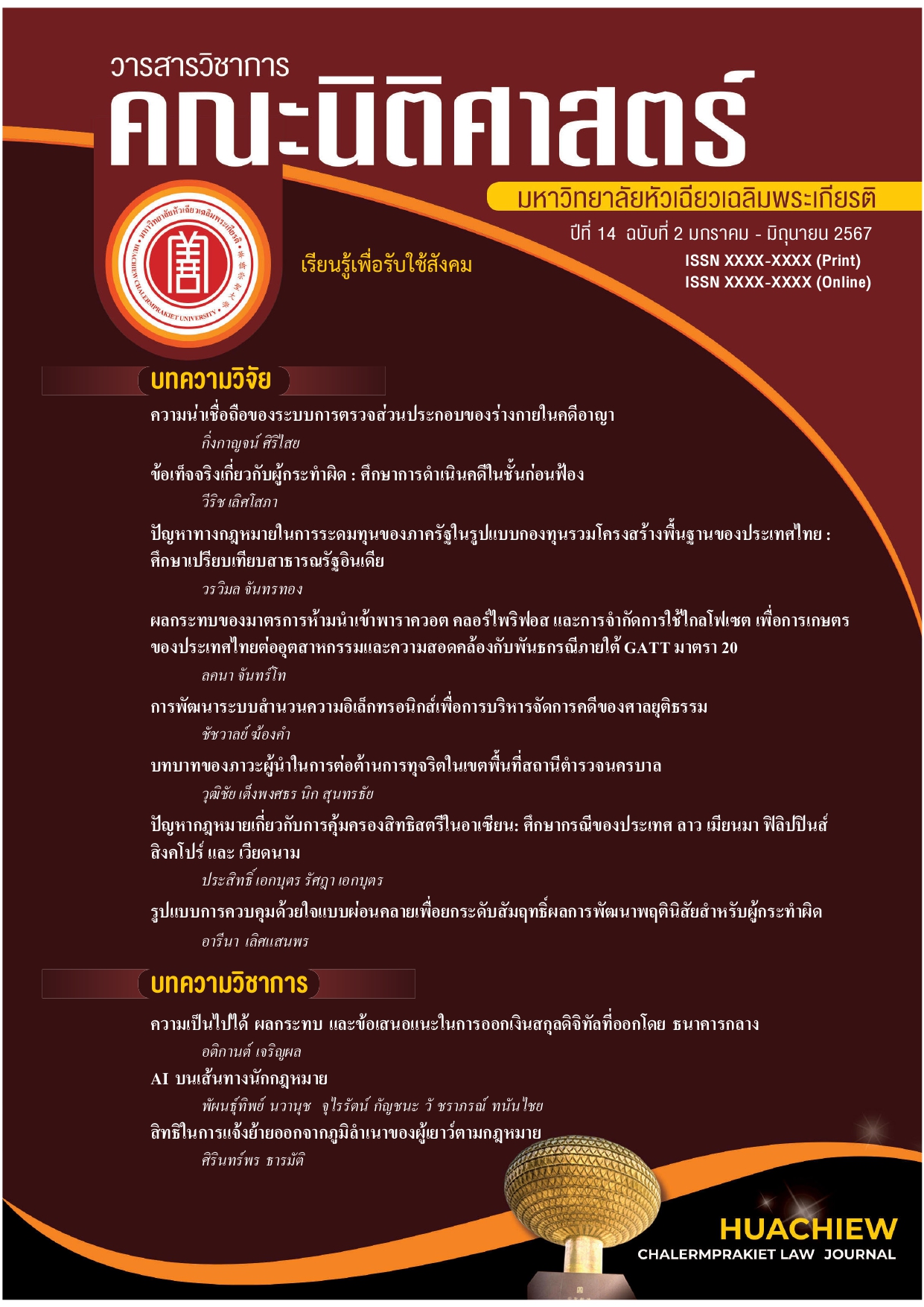FACTS RELATED TO THE ACCUSED : A STUDY OF PRE-TRIAL PROSECUTION
Keywords:
Facts relating to the accused, Examination principle, Fact-findingAbstract
To process a criminal case in Thailand, police officers receive a complaint from an injured party and compile all evidence before arresting the accused. Officers must also protect legal rights of the accused. Article 29, paragraph 2 of the Constitution of the Kingdom of Thailand, B.E.2560 (2017) specifies that an accused should be presumed innocent until proven guilty by a court of law
This principle certifies the pre-trial innocent status of the accused, but in practice, inquiry officers compiling an evidence and investigating the accused typically treat them antagonistically by. Focusing on evidence potentially fulfilling the fault element to fulfill prosecutory orders to the court.
Applicable facts beneficial to the offender are usually ignored as irrelevant and not included in the investigatory report. Even Yet Articles 131 and 138 the Thai Criminal Procedure Code (CPC) indicate the investigatory principle that inquiry officers should gather all evidence proving the innocence or guilt of defendants, in addition to examining the backgrounds of the accused.
Without these contextual facts continuously present in investigative reports from inquiry officers about the accused, prosecutors cannot effectively evaluate cases, including advising the court during sentencing. The modern judgment process focuses on rehabilitating, rather than incarcerating, offenders or isolating them from society. Accurate judgments about the accused reply on individualization, and related facts can help resolve prison overcrowding and long-term societal criminality.
This Article focuses on problems in pre-trial reception of facts about the accused information helping prosecutors effectively evaluate cases and judges during sentencing. A comparative international study was made of the judgment process, reliable facts about the accused and foreign related procedures and implementation. The goal was to improve, and render more effective, transmission of facts related to the accused in Thailand.
References
เกียรติขจร วัจนะสวัสดิ์, “การควบคุมอำนาจพนักงานสอบสวนตัวอย่างของสหรัฐอเมริกา” (2521) 9:4 วารสารนิติศาสตร์.
เกียรติภูมิ แสงศศิธร, กระบวนการกำหนดโทษคดีอาญา : เปรียบเทียบของไทยกับต่างประเทศ (นิติศาสตร์มหาบัณฑิต, คณะนิติศาสตร์ มหาวิทยาลัยธรรมศาสตร์, 2533).
คณิต ณ นคร, กฎหมายวิธีพิจารณาความอาญา, (กรุงเทพฯ: วิญญูชน, พิมพ์ครั้งที่ 11, 2566).
คณิต ณ นคร, รวมบทความด้านวิชาการของ ศาสตราจารย์ ดร. คณิต ณ นคร (กรุงเทพฯ: พิมพ์อักษร, 2540).
คณิต ณ นคร, “วิธีพิจารณาความอาญาไทย : หลักกฎหมายกับทางปฏิบัติที่ไม่ตรงกัน” (2528) 15:3 วารสารนิติศาสตร์.
ณัฐพงศ์ สวัสดิ์วงษ์พร, การค้นหาความจริงจากภูมิหลังผู้ต้องหาในชั้นสอบสวน (นิติศาสตร์มหาบัณฑิต, คณะนิติศาสตร์ มหาวิทยาลัยธรรมศาสตร์, 2550).
ทวีศักดิ์ ภักดีโต, ทะเบียนประวัติอาชญากร (นิติศาสตร์มหาบัณฑิต, คณะนิติศาสตร์ มหาวิทยาลัยธรรมศาสตร์, 2544).
มานะ เผาะช่วย, ระบบการดำเนินคดีอาญาชั้นเจ้าพนักงาน : ศึกษาเปรียบเทียบระบบของประเทศอังกฤษ ฝรั่งเศส และประเทศไทย (นิติศาสตร์มหาบัณฑิต, คณะนิติศาสตร์ มหาวิทยาลัยธรรมศาสตร์, 2556).
เศรษฐชัย อันสมศรี, ดุลยพินิจในการกำหนดโทษจำคุก (นิติศาสตร์มหาบัณฑิต, คณะนิติศาสตร์ มหาวิทยาลัยธรรมศาสตร์, 2547).
สัตยา อรุณธารี, อำนาจของพนักงานอัยการเกี่ยวกับการสอบสวนคดีอาญา (นิติศาสตร์มหาบัณฑิต,คณะนิติศาสตร์ จุฬาลงกรณ์มหาวิทยาลัย, 2520).
สุรศักดิ์ ลิขสิทธิ์วัฒนกุล, ประมวลกฎหมายวิธีพิจารณาความอาญา ฉบับอ้างอิง (กรุงเทพฯ: วิญญูชน, พิมพ์ครั้งที่ 23, 2565).
อุดม รัฐอมฤต, “การฟ้องคดีอาญา” ใน ดร.สมคิด เลิศไพฑูรย์และคณะ, รวบรวมบทความทางวิชาการเนื่องในโอกาสครบรอบ 80 ปี ศาสตราจารย์ไพโรจน์ ชัยนาม (กรุงเทพ: มหาวิทยาลัยธรรมศาสตร์, 2535).
อุททิศ แสนโกศิก, การดำเนินคดีอาญาในสหรัฐอเมริกา (กรุงเทพ: มหาวิทยาลัยธรรมศาสตร์, 2514).
Downloads
Published
How to Cite
Issue
Section
License
Copyright (c) 2024 Huachiew Chalermprakiet Law Journal

This work is licensed under a Creative Commons Attribution-NonCommercial-NoDerivatives 4.0 International License.
บทความหรือข้อความคิดเห็นใด ๆ ที่ปรากฏในวารสารฉบับนี้เป็นวรรณกรรมของผู้เขียนโดยเฉพาะ คณะนิติศาสตร์มหาวิทยาลัยหัวเฉียวเฉลิมพระเกียรติ และกองบรรณาธิการไม่มีส่วนรับผิดชอบหรือไม่จำเป็นต้องเห็นด้วยกับข้อคิดเห็นนั้น แต่ประการใด








